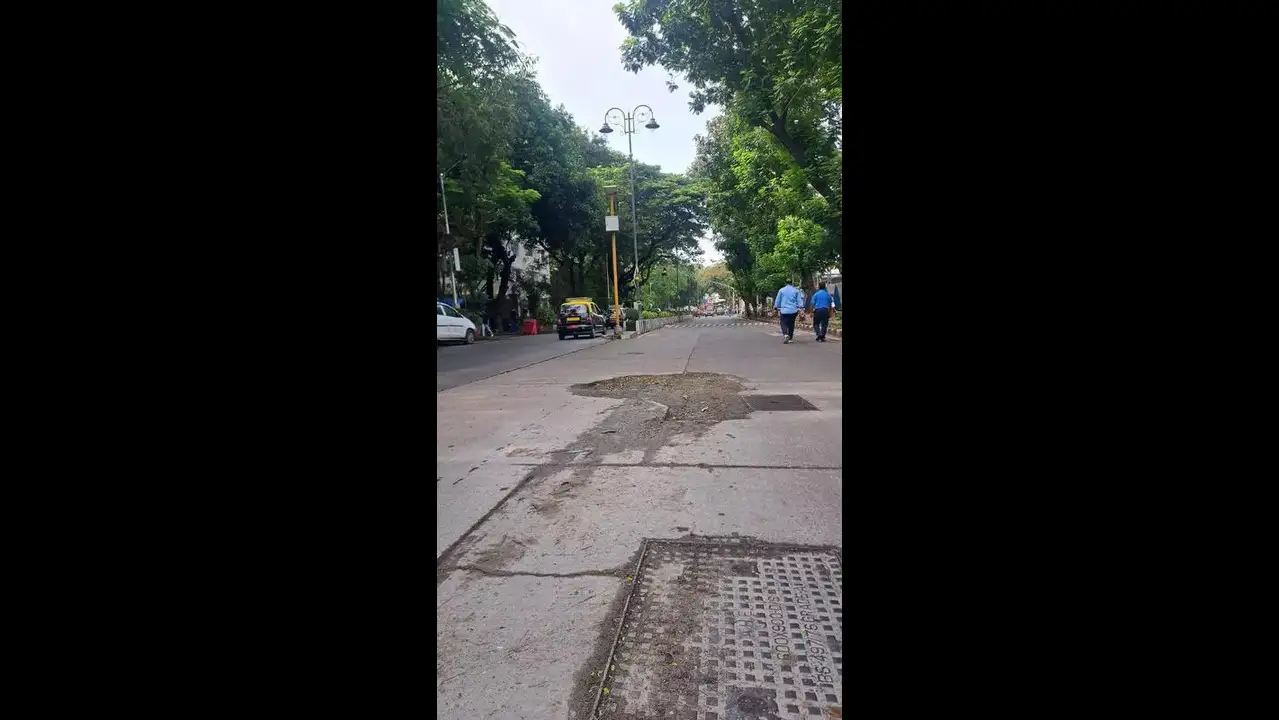Mumbai’s Churchgate area has been grappling with a dangerously large pothole near the Income Tax office, causing traffic disruption and posing a safety risk to motorists for over a month. Despite a ₹5 crore road maintenance contract for the zone, the crater remains unrepaired, sparking public frustration and raising concerns about the quality and oversight of civic infrastructure works in South Mumbai.
The pothole, which lies on a busy thoroughfare used by school buses, government vehicles, and daily commuters, has become a daily hazard. Multiple complaints had been lodged by citizens and local activists, but no remedial action was taken until the issue drew public attention. According to civic activists, the road falls under the jurisdiction of the Central Roads Department of the Brihanmumbai Municipal Corporation (BMC), which is responsible for maintaining Wards A through D—an area comprising Mumbai’s southernmost precincts. The delay in repair work, despite pre-monsoon maintenance commitments, has renewed concerns about how public funds are utilised and monitored. Civic sources confirmed that the road repair contract covers resurfacing, pothole filling, and maintenance across the entire Zone-I area, yet ground-level execution remains questionable. One official, when contacted, admitted that the damaged section was not technically a pothole but an incomplete joint-cutting job on the concrete road that had deteriorated further with recent rains.
Activists have pointed out that similar instances of poor workmanship are widespread across Mumbai’s heritage precincts. The stretch from Churchgate to Charni Road reportedly has several patches with joint cuts that were either not properly filled or remain pending since the previous cycle of repairs. Given the proximity to key landmarks and administrative offices, such civic lapses are being seen as systemic neglect rather than isolated issues. Motorists in the area expressed frustration over the risk posed by such road conditions. Riders of two-wheelers have been particularly vulnerable, with several minor incidents reported due to the uneven surface and sudden depression on the road. The situation poses significant risk, especially during rain spells when potholes are often concealed under stagnant water.
Senior civic officials acknowledged the complaint and said an agency had been appointed to address potholes on a routine basis. The BMC’s Additional Commissioner confirmed that potholes reported to the department would be addressed promptly, typically by night, to avoid peak-hour disruptions. The official also noted that an internal review would be conducted to determine why the repair in Churchgate was delayed despite clear guidelines. The administration has assured citizens that disciplinary action will be taken against those found negligent in adhering to monsoon preparedness norms. Meanwhile, civic watchdogs have called for greater transparency in the tendering and execution processes, suggesting that performance-linked contracts could incentivise better outcomes.
Urban infrastructure experts argue that the persistence of such issues in Mumbai, despite high-budget allocations, underlines the urgent need for a systemic overhaul. They emphasise that resilient urban roads are critical not only for commuter safety but also for the seamless functioning of public services, particularly during emergencies. From a sustainability standpoint, poorly maintained roads also contribute to fuel inefficiency and increased vehicular emissions, indirectly undermining the city’s climate goals. Repeated digging, patchwork repairs, and lack of standardisation in road materials further add to Mumbai’s ecological and financial burden.
City planners are advocating the use of long-lasting materials like mastic asphalt and polymer-modified concrete in high-traffic zones. They also recommend sensor-based monitoring of road health to allow for proactive maintenance. Integrating such systems could align Mumbai’s infrastructure ambitions with sustainable urbanism, a goal enshrined in both municipal policy and public expectation. As the city braces for heavier monsoon spells in July, the Churchgate pothole episode serves as a reminder of the critical need for timely maintenance, citizen accountability, and smarter urban planning. Whether the civic body rises to the challenge remains to be seen, but for now, the road near the income tax office continues to reflect a deeper malaise in Mumbai’s infrastructure governance.
Also Read : Maharashtra Hikes Vehicle Tax From July 1 Hitting CNG and Luxury Car Buyers


